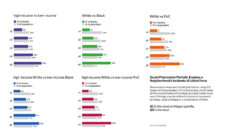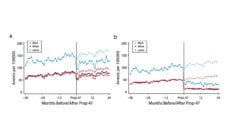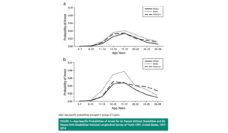The murders of Breonna Taylor, Ahmaud Arbery, George Floyd, and Rayshard Brooks in 2020 elevated the national conversation on the Black Lives Matter movement and police violence against minority communities.
While police murders are rare, the routine gestures of policing, like street stops, touch many lives. American police officers conduct 2.5 million street stops every year. Only 15% of those stops end in a ticket or an arrest. Yet each one of those stops is an interaction with the criminal justice system, a fear-inducing event, and some lead to incarceration in a nation that has over two million people behind bars, about a quarter of the world’s prisoners.
A team of researchers led by Ram Sundaresh studied the link between police interactions and individuals’ wellbeing to measure how policing affects health. They used the Family History of Incarceration Survey to gather information from 1,806 people with immediate family who were incarcerated and 1,009 who did not have incarcerated family members. The survey included questions about incarceration and contact with police, along with questions about well-being, a holistic measure that considers a participant’s physical, mental, emotional, social, and spiritual selves. Recent studies found the measure predicts life expectancy and alters risk of preterm birth.
Incarceration is linked to poor mental and physical health and destroys families and communities, but the compounding effects of numerous contacts between police and residents show that even relatively benign police interactions have the potential to alter wellbeing.
In total, 57% of the men and 31% of the women reported any legal system interaction. Black respondents, those with lower household incomes, and people with a history of drug or alcohol addiction had a higher chance of contact with police. Police stopped 29% of study participants, stopped and frisked 16%, and arrested 31%. Twenty-three percent of respondents had been incarcerated for at least one night.
The researchers found that exposure to the police – regardless of whether it was a routine traffic or street stop, being stopped and frisked, having been arrested, or spending time incarcerated – lowered a person’s overall wellbeing. Interactions with the police worsened every domain of wellbeing: physical and mental health, social support, and their spiritual life. For those who had any interaction with the police, continued contact eroded health. For example, individuals stopped and frisked more than once had declines in wellbeing comparable to those who spent extended periods of time incarcerated.
Incarceration and more aggressive policing strategies, like stop and frisk, induce anxiety and trauma. Incarceration is linked to poor mental and physical health and destroys families and communities, but the compounding effects of numerous contacts between police and residents show that even relatively benign police interactions have the potential to alter wellbeing. Over-policed communities bear a greater risk of negative health effects. In response, these researchers urge a drastic reworking of policing in the US. If we do not radically rethink policing, every interaction with the police may continue to have drastic effects on a person’s health.
Photo via Getty Images














